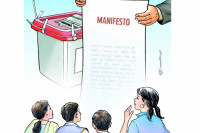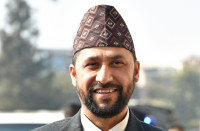National
Chief justice administers oath to heads of transitional justice commissions amid victim backlash
Transitional justice bodies reconstituted, but conflict victims decry selection process as politically-driven.
Post Report
Chief Justice Prakash Man Singh Raut on Sunday administered the oath of office and secrecy to the newly appointed chairpersons of the Truth and Reconciliation Commission (TRC) and the Commission of Investigation on Enforced Disappeared Persons (CIEDP), reactivating the long-stalled transitional justice process.
At a formal ceremony held at the Supreme Court, Raut administered the oath to former high court judge Mahesh Thapa as chair of the TRC and former chief secretary Leeladevi Gadtaula as chair of the CIEDP. Following the ceremony, both chairs administered the oath of office to members of their respective commissions.
The TRC now comprises chairperson Thapa along with members Achyut Prasad Bhandari, Tika Prasad Dhakal, Padam Bahadur Shahi, and Kumari Kaushalya Ojha. The CIEDP is led by Gadtoula, with members Gopal Nath Yogi, Agni Prasad Thapaliya, Sirjana Pokharel, and Binita Nepali.
The appointments were made on May 15 by the Council of Ministers based on the recommendations of a selection committee formed under the Enforced Disappearances Enquiry, Truth and Reconciliation Commission Act, 2014.
The committee, led by former chief justice Om Prakash Mishra, shortlisted ten candidates from among 111 applicants including retired judges, civil servants, and rights advocates.
However, the move has been mired in controversy, with victims’ groups and human rights organisations expressing strong dissatisfaction over what they describe as a rushed and opaque selection process.
Just hours before the appointments were announced, 39 organisations representing victims of the 1996–2006 Maoist insurgency had issued an open letter to Prime Minister KP Sharma Oli, urging the government not to proceed without wider consultation.
“Any decision imposed in a coercive ‘take it or leave it’ manner—ignoring our dignity and imposing unjust choices—is unacceptable to us,” the letter read.
Victim representatives also met United Nations Resident Coordinator in Nepal, Hanna Singer-Hamdy, to convey their concerns. In a post on X, she emphasised the importance of victim participation in transitional justice, writing, “A truly transformative process ensures meaningful engagement of the victims at every stage. Participation strengthens the legitimacy and credibility of the process.”
Despite these appeals, the government moved forward with the appointments, prompting accusations that the process had been politically orchestrated. Victims have long insisted that transitional justice mechanisms must be survivor-centred, inclusive, and transparent.
With the formal reactivation of the commissions, all eyes are now on whether the new leadership will be able to restore public trust and address longstanding demands for truth, justice, and reparations. However, with victims and rights defenders continuing to express deep scepticism, the path forward for Nepal’s transitional justice process remains uncertain.




 11.12°C Kathmandu
11.12°C Kathmandu














